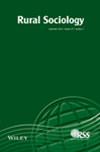Farmers' Social Capital in Agricultural Decision‐Making☆
IF 1.9
3区 社会学
Q2 SOCIOLOGY
引用次数: 0
Abstract
Reducing tillage is a key goal for conservation and regenerative agriculture, yet research has struggled to identify ways to increase the use of the practice among farmers. Recent scholarship has identified social capital as an important piece of the adoption puzzle. However, the ways in which farmers' social capital influences conservation practice use are seldom identified or explored. In this study, we tested the effects of three measures of social capital on the adoption of no‐till among 1,523 row crop farmers in the United States Corn Belt. Specifically, we operationalized the extent to which farmers' social networks, network trust, and community conservation norms affect intra‐individual processes and thus influence farmers' decisions regarding adoption. Our results identified key mechanisms for the promotion of conservation practices through social capital. Subjective conservation norms emerged as a main pathway through which farmers' social capital influenced their use of no‐till, indicating that networks, network trust, and community norms can increase adoption through affective paths. We conclude that academic research and policy experts should continue to situate farmers as social actors and pay heed to the norms and cultural expectations surrounding agricultural conservation practices.农民社会资本在农业决策中的作用[j]
减少耕作是保护和再生农业的一个关键目标,然而研究一直在努力寻找增加农民使用这种做法的方法。最近的学术研究发现,社会资本是收养难题的重要组成部分。然而,农民社会资本影响保护实践利用的方式很少被识别或探索。在这项研究中,我们测试了三种社会资本对美国玉米带1523名行耕农民采用免耕的影响。具体来说,我们将农民的社会网络、网络信任和社区保护规范对个体内部过程的影响程度进行了操作,从而影响了农民关于收养的决定。我们的研究结果确定了通过社会资本促进保护实践的关键机制。主观保护规范是农民社会资本影响其免耕行为的主要途径,表明网络、网络信任和社区规范可以通过情感途径增加免耕行为的采用。我们的结论是,学术研究和政策专家应继续将农民定位为社会行动者,并关注围绕农业保护实践的规范和文化期望。
本文章由计算机程序翻译,如有差异,请以英文原文为准。
求助全文
约1分钟内获得全文
求助全文
来源期刊

RURAL SOCIOLOGY
SOCIOLOGY-
CiteScore
4.60
自引率
13.00%
发文量
47
期刊介绍:
A forum for cutting-edge research, Rural Sociology explores sociological and interdisciplinary approaches to emerging social issues and new approaches to recurring social issues affecting rural people and places. The journal is particularly interested in advancing sociological theory and welcomes the use of a wide range of social science methodologies. Manuscripts that use a sociological perspective to address the effects of local and global systems on rural people and places, rural community revitalization, rural demographic changes, rural poverty, natural resource allocations, the environment, food and agricultural systems, and related topics from all regions of the world are welcome. Rural Sociology also accepts papers that significantly advance the measurement of key sociological concepts or provide well-documented critical analysis of one or more theories as these measures and analyses are related to rural sociology.
 求助内容:
求助内容: 应助结果提醒方式:
应助结果提醒方式:


